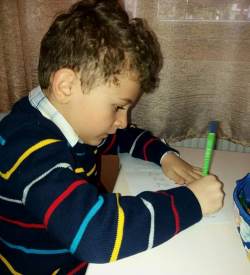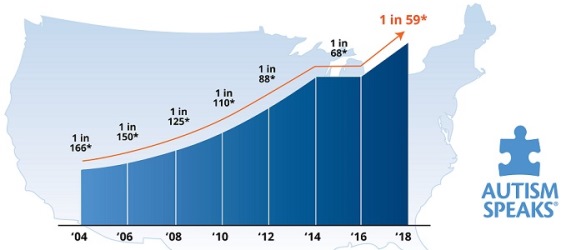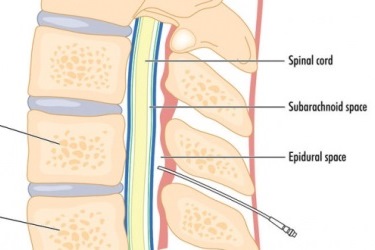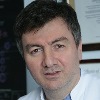You are here
Nicoloz Story: Autism treatment with intrathecal injection of autologous cord blood
 Nikoloz is an 8 year old boy who lives in Georgia. His parents stored his cord blood in the family bank Geocord, located in Tbilisi. They had no particular reason for storage, but they trusted their obstetrician, who recommended doing so.
Nikoloz is an 8 year old boy who lives in Georgia. His parents stored his cord blood in the family bank Geocord, located in Tbilisi. They had no particular reason for storage, but they trusted their obstetrician, who recommended doing so.
After two years the parents noticed that something was wrong in the development of Nicoloz: his emotional outbursts were often, he could not speak even single words, his attention was poor, he did not communicate with other children and showed no interest in them. At the age of three years Nicoloz was diagnosed with childhood autism.
Autism Spectrum Disorder (ASD) is a neuro-developmental condition with onset early in life. The stereotypical autism behaviors are impairment of social communication, repetitive behaviors, and restricted activities and interests. The causes of autism are heterogeneous; sometimes there is a genetic predisposition and other times it might be from environmental exposures. Research has identified some differences in the brain morphology and activation of patients with autism, but there is no drug or behavioral therapy that can cure the disorder.
The Centers for Disease Control and Prevention (CDC) released new data on the prevalence of ASD in the United States in April 2018. Their surveillance identified 1 in 59 children (1 in 37 boys and 1 in 151 girls) as having ASD. The rates of diagnosis are higher in those regions which are more affluent and have better schools, suggesting that ASD is being under-diagnosed in communities with less access to diagnostic resources. In the previous national survey, the overall prevalence of ASD was 1 in 68, and five years ago it was 1 in 88. It seems that the growing awareness of ASD among parents and educators has led to more and more children being diagnosed with ASD.

Around the world, the cost of caring for individuals with autism is high. According to the advocacy group Autism Speaks, in the United States the lifetime cost of caring for an individual with autism averages $2.4 million when autism involves intellectual disability and $1.4 million when it does not. About 40% of individuals on the autism spectrum have an intellectual disability. In the United States the costs for all patients are estimated to be $236 billion a year.
After his diagnosis with autism, Nicoloz underwent Applied Behavior Analysis (ABA) therapy. This is an intensive training program that was developed to teach important life skills to children with autism, starting with communication ability but also including school behavior, social relationships, self-care and employment behavior as needed. However, Nicoloz only made small improvements with the help of ABA, and could only speak about three words correctly.
In 2016 the parents of Nicoloz saw a medical program on TV where they found out that a child’s own cord blood could alleviate autism symptoms. They contacted their cord blood bank Geocord, and received information about therapy options in Georgia. The Mardaleishvili Medical Center in Tibilisi, a clinic with experience using autologous stem cells for spinal cord injury, is collaborating with Geocord to carry out a clinical study to treat childhood autism with autologous cord blood.
Nikoloz was enrolled in the study. The children in the study receive three intrathecal injections of their own cord blood stem cells, separated by 6 months intervals. The route of intrathecal injection involves passing a needle between the vertebrae of the spinal cord to deliver stem cells directly into the cerebrospinal fluid (CSF) that circulates around the brain and spinal cord.
Intrathecal injection has numerous advantages for the delivery of cell therapy to the brain. This route by-passes the blood brain barrier and enables the CSF to deliver the cells wherever they are needed - to every part of the cortex, cerebellum, and limbic system - because the CSF is in constant circulation throughout subarachnoid space of the brain and spinal cord. Therefore, all transplanted cells reach the damaged sites and as a result, stronger paracrine effects can occur. By comparison, when cells are injected intravenously, most of the cells are filtered from the blood by the lungs, spleen and liver, and the remaining cells face the blood-brain barrier. The number of cells that are able to reach the brain is important to the success of the therapy.
Geocord stores their client’s cord blood stem cells in four cryovials. This allows transplanting patients several times. For the treatment of autism, no minimal cell dose has been established. The size of the dose used for each child in the study depended on the number of cells available in their stored cord blood. The children’s response was monitored using the Vineland Adaptive Behavior Scale-II, ADOS-2. To date, this study has found that cell doses as low as 68 million nucleated cells per injection have showed effect.
Nikoloz showed significant improvement after two injections. His vocabulary drastically increased until now he is able to speak virtually every word and communicates in short sentences. He can read, write, paint, and solve arithmetical problems. His behavior also improved so that he is not aggressive and no emotional outbursts are reported anymore. Nicoloz now attends regular school and studies with a slightly adopted program.
The parents of Nikoloz have always been deeply involved in their son’s therapy and training. They now feel as if some kind of miracle has happened because of the improvement of their son’s condition. In reality, they have created for themselves this miracle, by deciding to store Nikoloz’s cord blood.



 image credit: Fred Geisler, MD PhD, Highlight from the 30th Annual Meeting of the North American Spine Society (NASS) in Chicago,
image credit: Fred Geisler, MD PhD, Highlight from the 30th Annual Meeting of the North American Spine Society (NASS) in Chicago,  Gocha Shatirishvili, MD PhD, is the medical director of the cord blood stem cell bank Geocord, the only cord blood bank in the nation of Georgia. Geocord operates their own laboratory since 2006, with everything that is needed for high quality cord blood processing: hematology, flow cytometry, PCR. Geocord processes cord blood units 365 days in year, with maximal time from collection to freezing of 24 hours, and thousands cord blood units are stored in the bank.
Gocha Shatirishvili, MD PhD, is the medical director of the cord blood stem cell bank Geocord, the only cord blood bank in the nation of Georgia. Geocord operates their own laboratory since 2006, with everything that is needed for high quality cord blood processing: hematology, flow cytometry, PCR. Geocord processes cord blood units 365 days in year, with maximal time from collection to freezing of 24 hours, and thousands cord blood units are stored in the bank.